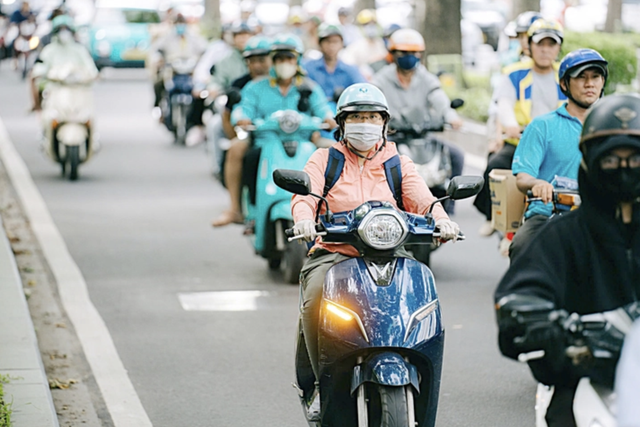
Vietnamese electric motorbike market heats up as manufacturers race to expand
As major cities in Vietnam like Hanoi and Ho Chi Minh City move to phase out gasoline-powered two-wheelers, both local and international manufacturers are ramping up investment in production, retail networks, and consumer incentives, fueling rapid growth in the country’s electric motorbike market.
According to a market study by Mordor Intelligence, Vietnam's electric vehicle (EV) market is projected to be worth US$2.93 billion in 2025, with expectations to reach $6.69 billion by 2030, reflecting a compound annual growth rate of 18 percent.
Experts noted that this surge in demand also drives the need for a robust charging infrastructure and energy supply tailored for electric vehicles.
A recent survey conducted by Tuoi Tre (Youth) newspaper in Hanoi found an increasingly diverse consumer base for electric motorbikes.
While students remain key customers, usage has expanded to office workers, delivery drivers, and even middle-aged consumers, said Hung, owner of an electric motorcycle store on Tran Phu Street.
With prices typically ranging from VND10 million to VND20 million ($382-$764) per unit, brands are not only competing on price but also on technology integration, offering smarter and more efficient options.
Currently, Chinese and Vietnamese brands dominate market share, with models from DKBike, VinFast, Dat Bike, Nijia, and Selex Motors.
Chinese brands such as Yadea and Tailg are expanding aggressively in Vietnam, while traditional gasoline-powered giants like Honda, Yamaha, Piaggio, and Suzuki are also launching electric models.
While many Vietnamese brands remain small-scale or startups with limited capital, foreign players bring large-scale operations, with their newly launched models being increasingly competitive, boasting smart features and higher performance.
Vietnam's electric motorbike market share has seen steady growth, from 5.4 percent in 2019 to 10 percent in 2021, and 12 percent in 2022.
The double-digit momentum is expected to continue, making Vietnam an attractive market for manufacturers.
Infrastructure challenges and charging station race
Data from Motorcycles Data revealed Vietnam's strong sales growth in the first half of 2025.
Models with engines under 50cc saw a staggering 112.6-percent surge, while models over 50cc posted a 52.6-percent growth rate.
Despite increasing demand, charging time and infrastructure remain major barriers.
Many electric motorbikes require up to eight hours of charging for a range of about 100 kilometers.
As such, manufacturers are investing not only in new vehicle models but also in battery efficiency improvements and charging infrastructure.
Liu Jia, general director of Yadea Vietnam, said the company aims to capture over 40 percent of the local market, planning to expand its nationwide network of charging stations.
He emphasized the need for clear regulations on charging station standards, particularly in residential and commercial areas.
Bui Hai Nam, CEO of DIMEC Charging Solutions JSC, the partner behind VinFast's V-Green charging station franchise model, said that higher demand for EVs has pushed up the investments in charging infrastructure.
With only 5,000 charging stations and 55,000 connectors nationwide, covering just three percent of current demand, there is significant room for growth.
Nam believed that expanding this infrastructure will not only meet user needs but also enhance safety and user confidence in electric motorbikes.
Attractive consumer incentives
To gain a competitive edge, Chinese manufacturers in Vietnam have rolled out aggressive promotions, including consumer financing, trade-in discounts up to VND2 million ($76), and lucky draw campaigns.
Vietnamese brands are also following suit.
VinFast has introduced its Evo Grand and Evo Grand Lite models, featuring dual removable batteries and a maximum range of 262 kilometers.
As part of its promotional strategy, Hanoi-based customers can obtain the electric motorcycles with zero upfront cost, and drivers registering via the Xanh SM platform operated by Green and Smart Mobility Joint Stock Company (GSM), a taxi and electric vehicle rental company owned by Vietnam's largest private enterprise Vingroup, receive a 10-percent discount with payment terms of up to three years.
Individual buyers also benefit from 10-percent price reductions, only needing to pay 10-percent upfront, with the remainder available through installment plans.
The company also covers 100 percent of registration fees for Hanoi buyers.

Many residents get accustomed to using electric motorcycles. Photo: Thanh Hiep / Tuoi Tre
Chinese EV manufacturer doubles down on Vietnam
Liu recognized the EV transition policy as a strategic opportunity for EV makers in Vietnam.
Yadea is not only expanding its product line and retail footprint, targeting 1,000 outlets, but also building a new factory in former Bac Giang Province, part of the current Bac Ninh Province, which is a combination of the former Bac Ninh Province and neighboring Bac Giang Province, effective from July 1.
This facility is set to boost production capacity from 300,000 to two million units per year.
"With the government's supporting policies, firms will have many opportunities to accelerate the shift toward green transportation," said Liu.
"This is why we are committed to increasing production capacity, boosting localization rates, and investing heavily in R&D."
Tieu Bac - Ngoc An / Tuoi Tre News
Link nội dung: https://news.tuoitre.vn/vietnamese-electric-motorbike-market-heats-up-as-manufacturers-race-to-expand-10325081513342745.htm